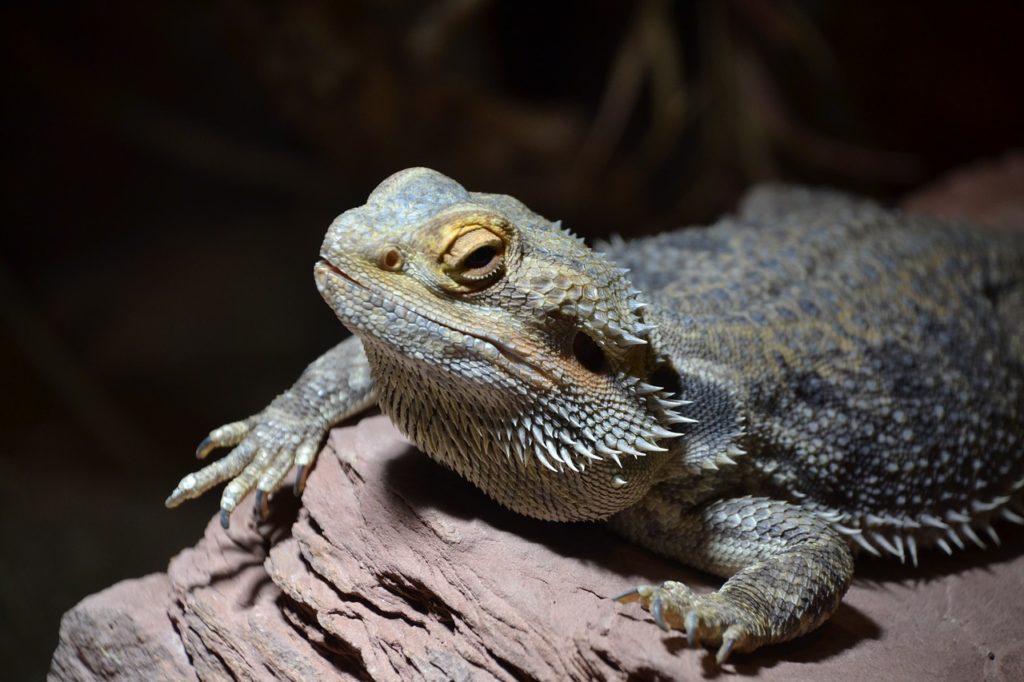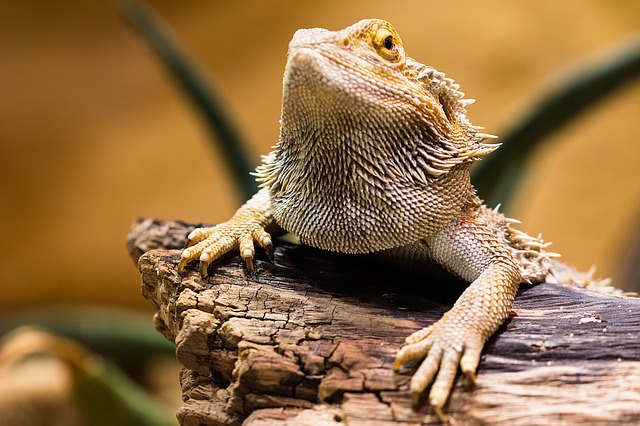Bearded dragons are voracious eaters when healthy, and most will gladly devour a tasty bug or collard green leaf whenever offered.
But while their appetite makes them easy to feed and care for, it can also cause problems. In fact, if fed excessive amounts of food, bearded dragons can become overweight.

This can cause a number of serious health problems for your pet and reduce his quality of life. Accordingly, it is important to keep an eye on your dragon’s body weight and condition and ensure that you don’t allow him to put on too much weight.
There are, however, three basic things you can do to help a portly lizard slim down if he’s already exceeded a healthy body weight.
We’ll explain each of the three and provide some other general weight-management tips for your bearded dragon below.
Quick Navigation
The Three Primary Ways to Reduce Your Fat Bearded Dragon Slim Down

No matter what type of animal you’re caring for (including yourself), there is only one basic method for reducing bodyweight: Creating a caloric deficit.
Simply put, you need your bearded dragon to expend more energy than he consumes.
Over time, this will cause his body to use stored fat to fuel his body, thereby reducing his body weight.
However, there are a few different techniques you can use to achieve a caloric deficit. We’ll discuss each in greater detail below.
1. Reduce the Amount of Food Provided
The simplest way to help your bearded dragon shed some excess body weight is by reducing the amount of food you give him.
For example, if you normally feed your bearded dragon two dozen crickets per day, you may want to start skipping one or two feedings per week or reducing the number of crickets you offer at each meal.
Just be sure to do so gradually – your bearded dragon didn’t become overweight overnight, and it’ll take time for him to slim down.
Also, it is important to ensure your bearded dragon is still getting enough food; you don’t want to put him on a starvation diet, as this would simply be cruel.
2. Change the Ratio of Foods Offered
Not all foods are created equally, and the combination of foods you provide your bearded can influence his tendency to gain or lose weight.
For example, your bearded dragon’s fruits and vegetables won’t provide nearly as many calories as his insect prey will (given similar quantities).
Likewise, some insects – such as waxworms – have more calories than many other species.
So, if you are trying to help your bearded dragon shed a little weight, you may want to provide more plant matter and a little less insect prey.
This will also help ensure your bearded dragon’s stomach will still remain full, thereby preventing him from being famished while he’s losing weight.
Similarly, it is wise to reduce the number of fatty waxworms you provide and instead focus on feeding your pet crickets and roaches.
3. Provide Your Bearded Dragon with More Exercise
Reducing the number of calories your bearded dragon ingests is one way to help him lose weight, but there is another way you can create a caloric deficit – by encouraging your pet’s body to burn more of the calories he consumes.
However, bearded dragons are rarely willing to run on a treadmill, so it can be tricky to figure out how to get them to burn more calories.
Nevertheless, there are three viable strategies for doing so:
- Increase the size of his enclosure. By simply giving your bearded dragon a larger plot of land to explore, he’ll likely move around more often, thereby helping him to burn more calories.
- Switch to crickets, roaches, and other types of swift prey. Some keepers satisfy their pet’s protein needs with relatively immobile insects, such as mealworms and super worms. But if you provide your lizard with more mobile insects, he’ll burn more calories while chasing them down.
- Handle him more regularly. Handling your bearded dragon and letting him explore more of the world will also help him burn a few more calories. Just be careful that you don’t handle him too often or for too long at a given time. Try to limit the handling to once per day and limit each session to 10 minutes or so.
Miscellaneous Weight-Management Tips for Bearded Dragons

It is important to manage your bearded dragon’s weight over time, as this will help you avoid being faced with an overweight dragon in the first place.
Ideally, you’d like to see your bearded grow steadily while young, stay at a very healthy body weight for most of his adult life, and avoid any drastic fluctuations.
There are a few different ways to help do so, which we’ll outline below.
Weigh Your Bearded Dragon Regularly
The best way to monitor your bearded dragon’s growth, body condition and overall health is by weighing him regularly.
You needn’t do so on a terribly frequent schedule – once per week is probably ideal. Be sure to record his weights in a journal or spreadsheet so you can track the info over time.
To weigh your lizard, you’ll need a digital scale that is accurate to 1-gram increments, and you’ll also want a container of some type, in which your lizard will rest while you’re obtaining his weight.
Just be sure to subtract the weight of the container to obtain your dragon’s body weight. It’s often a good idea to go ahead and write the weight of the container on the plastic somewhere, so you don’t have to re-weigh it each time.
Visit Your Vet Often
Bearded dragons aren’t dogs or cats who need a set of vaccinations every year, but you should still work closely with your vet to keep your pet in the best health possible.
This is especially true of novice keepers, who may not recognize some of the subtle signs that can indicate a health problem.
In fact, by visiting your vet often (say, once per year or so), your bearded dragon will undoubtedly suffer fewer health problems and remain relatively parasite-free.
Additionally, your vet will be able to help you determine the ideal body weight you should target when designing your pet’s feeding regimen.
Gut-Load Your Feeder Insects
In addition to feeding your bearded dragon a proper quantity of feeder insects, it is important to make sure your feeder insects are full of nutritious food themselves.
This will help improve the nutritional value of the feeder insects and ensure that your bearded dragon is getting good “value” for each bug he eats.
To gut load your insects, provide them with a small dish of whole grains (such as oatmeal), and a small amount of fruits and vegetables for moisture.
You can simply use the same fruits and vegetables you feed your bearded dragon, but just about any dark green leafy vegetables or colorful fruits will work well.
Final Thoughts
It isn’t terribly difficult to get a bearded dragon to lose a little weight, but it does take quite a bit of time. Accordingly, the best strategy is to simply prevent your pet from becoming overweight in the first place.
However, if you find yourself confronted by an obese lizard, just follow the tips and strategies provided above, and you’ll be able to watch your lizard get a little bit lighter with time.